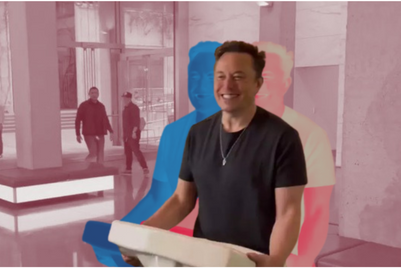
There are many things I bristle at when watching campaign case studies. There are some things I like, of course. Give me an ad that's presented as it actually ran, and I'm yours. But one of the things that sit oddly with me is the delight with which agencies (and, one would assume, their brand partners) proclaim they delivered whatever it was with no media spend.
I don't say this to trash earned media. There is significant value in coverage and attention that hasn't been paid for. Yet the research shows most brands – especially big ones – need to spend money to multiply their messages.
So, you might say it's no wonder that people outside the media industry can assume advertising is an overflowing font of money. If this were true, media owners/apps/celebrity wellness platforms/influencers would only have to place their ceremonial cups under the flow to achieve eternal profitability. And we'd have seen rather fewer quality and important media properties disappear over the past decade.
Someone who appears to have underestimated the complexity of selling advertising is Twitter owner Elon Musk. Hiring one of the most respected ad salespeople in the US, Linda Yaccarino, as his chief executive suggests he's caught on. After he announced the social network's rebrand to X last weekend, the business' UK team emailed advertisers and their agencies to explain the move.
In the email, which I've seen a copy of, X said the advertising community stands to be "one of the greatest benefactors" of the company's push to a "future state of unlimited interactivity". The email cities long-form publishing, a more immersive video offering, revenue-sharing deals for creators and new "brand adjacency protections" as benefits of the past eight months (ie the Musk era).
I found this interesting in the context of reports in the Wall Street Journal that X (see how it slipped off my keyboard there) was planning to introduce rules stripping brands of their verification if they don't spend a certain amount with the platform. If you think about it, though, this could also be seen as account-based sales – prioritising more proactive partners and offering them a premium experience. Twitter used to offer all its tools to everyone.
Netflix was very confident when it launched its advertising offering. UK media buyers described Netflix's initial ad prices as "extraordinarily bullish". The streaming giant and Microsoft are reportedly negotiating their ad deal in a bid for growth. Amid pressure from investors, Netflix launched its partially ad-funded tier in 2022 through a partnership with Microsoft, which provided technology and third-party ad sales.
Offering a glimpse into one possible future for media businesses, in the past few days online retailer THG, the owner of Lookfantastic, bought City AM out of administration. When I first started at Media Week in 2008, stories about the launch or success of national advertiser-funded magazines and newspapers were regulars in our own print (RIP) pages.
In a LinkedIn post on the group's purchase of the loss-making paper and website business, Matthew Moulding, founder and chief executive of THG, described media as "middlemen between consumers and brands". City AM will sit alongside the group's existing media assets, which include online magazines with a combined circulation of 600,000.
To bring this back to my original point, brands need places to put their ads. But, as Musk has found, advertisers need to trust platforms in order to be comfortable spending on them. For all the promises of editorial independence, how will THG's competitors feel about advertising on CityAM now (if they ever did, of course)? It is hard to forget such operations form part of a business' marketing efforts.
Rebuilding and maintaining trust is difficult. Whether it's as hard as launching commercial rockets 24 miles into space remains to be seen. It will be positive for advertisers, and their agency partners, if X and Netflix pull it off.
Maisie McCabe is UK editor of Campaign.


.jpg&h=334&w=500&q=100&v=20250320&c=1)

.jpg&h=334&w=500&q=100&v=20250320&c=1)

.jpg&h=334&w=500&q=100&v=20250320&c=1)



.png&h=334&w=500&q=100&v=20250320&c=1)

.jpg&h=268&w=401&q=100&v=20250320&c=1)



.png&h=268&w=401&q=100&v=20250320&c=1)


